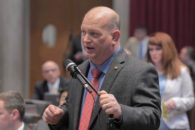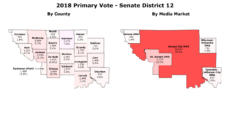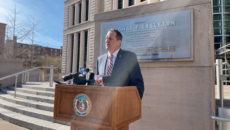JEFFERSON CITY, Mo. — Internet service providers advocated for legislative measures to better address the demand for broadband access in rural Missouri during a lengthy hearing before legislators Monday.
Ameren Missouri legislative representative Zach Monroe suggested lawmakers allow the power company to lease out unused fiber infrastructure to other providers, covering more customers and area throughout the state. Monroe said the move would save money while allowing other providers to make use of existing infrastructure without the need for additional construction.
“The legislation would only be applicable to our electric plant and allow us to provide broadband using existing electric easements,” Monroe said. “All the revenue would flow back to our electric customers. Our customers helped pay for improvements to the network, and they should see the financial benefits as well.”
Google Fiber’s Peter Cunningham and AT&T network process and quality manager Chris Bickel echoed the sentiment before the House Interim Committee on Broadband Development, arguing the change would bolster the network without requiring additional construction and allow communities, cooperatives, and businesses to work toward increasing access together.
Monroe also asked lawmakers to reform regulations to allow investor-owned and municipal providers to install broadband infrastructure along existing electric lines without needing to request a separate easement, a policy the legislature approved just for electric cooperatives in 2018. Monroe said the change would allow companies to avoid regulatory delays when expanding internet access to existing service areas.
Matt Kohly, director of Government and Carrier Relations for Socket Telecomm, urged the committee to consider recommending long-term fixed-rate loans from the state. While Missouri offers various grant programs, Kohly said loan programs could bolster productivity for providers and incentivize quicker work to pay off the investments.
He also advocated for an updated definition of “served” and “unserved” when it comes to broadband to better represent the breadth of the digital divide. Now, standards consider communities with at least one adequate connection to be served, creating inaccurate maps for providers and legislators to work off of, he said.
Marshall Stewart, the University of Missouri (UM) System’s chief engagement officer, said the Office of Broadband Development could use additional staff and funding and encouraged the legislature to create a commission to examine internet access, speed, and connectivity. Similar to a concept put into practice in West Virginia, the commission would be a step between the legislature and a regulatory body like the Public Service Commission.
Rep. Louis Riggs said the requests would be taken under consideration as the committee works its way through a report for the legislature.
“From a regulatory standpoint, do we have a magic bullet? No. Are we working on it? Yes,” Riggs, who chairs the committee, told The Missouri Times. “These are the things we need to take a hard look at and continue working with these folks to figure out a solution to this problem.”
The Missouri Farm Bureau and several of Missouri’s electric cooperatives advocated for increased investments before the committee last month, encouraging legislators to increase funding as they attempt to serve members in rural areas.
The committee is focused on four basic areas: business applications, online education, precision agriculture, and telemedicine. It is also looking at things other states have implemented when it comes to broadband access, Riggs said.
The committee is convening monthly throughout the interim and will file a report on its findings in December.
Missouri ranks No. 32 in broadband access with 147,000 unserved or underserved households and more than 392,000 individuals without reliable internet access, according to the Office of Broadband Development. However, the state has made drastic improvements despite the high numbers, substantially increasing its ranking since 2018.
Broadband is also a focus in Washington, D.C. According to a recent interactive map unveiled by the federal government, a majority of Missouri counties have at least 15 percent of their population without internet access at all with rural areas reporting even higher percentages.
Missouri is expected to receive a minimum of $100 million to improve the state’s broadband infrastructure under the Infrastructure Investment and Jobs Act, providing access to more than 330,000 residents.

Cameron Gerber studied journalism at Lincoln University. Prior to Lincoln, he earned an associate’s degree from State Fair Community College. Cameron is a native of Eldon, Missouri.
Contact Cameron at cameron@themissouritimes.com.










































